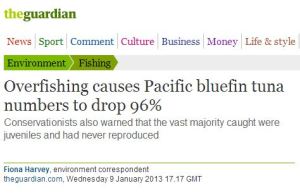http://www.theguardian.com/environment/2013/jan/09/overfishing-pacific-bluefin-tuna
Quotes and annotations from article below: 
“The bluefin tuna, which has been endangered for several years and has the misfortune to be prized by Japanese sushi lovers, has suffered a catastrophic decline in stocks in the Northern Pacific Ocean, of more than 96%”
– The globalization of cultural eating and healthy eating trends means more sushi is being consumed on a worldwide scale, not just Japan anymore – and the natural populations of Tuna can not keep up with the frequency and abundance of commercial catches.
– This insight into the market the majority of tuna is going to, or is to blame, provides a focus for message and helps us talk to a specific audience (public > sushi eaters).
“Equally concerning is the fact that about 90% of specimens currently fished are young fish that have not yet reproduced.” “More than nine out of 10 of the species recently caught were too young to have reproduced, meaning they may have been the last generation of the bluefin tuna.”
– This means it is not possible for the natural production of fish to keep up, or even come close to recovering the population of fish that is being caught.
“Last week, one fish sold in Japan for more than £1m, reflecting the rarity of the bluefin tuna and the continued demand for its fatty flesh, which is sold for high prices across Asia and in some high-end western restaurants.”
“the high value of the few remaining fish is a further encouragement to fishermen to hunt down the last of the species. A single specimen could make the catchers rich for life, and without catch limits and rigorous enforcement, there is nothing to stop fishermen pursuing them.”
– This is a problematic cycle as the fish will be more sought after due to the incentive of this high price they can be sold for, thus adding to the scarcity which is why the price is higher in the first place, so on and so on. They will just keep getting scarcer and more expensive until there is none left.
